-
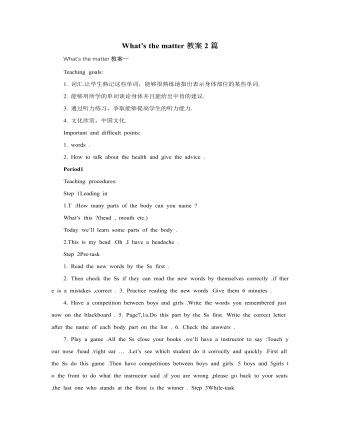
人教版新目标初中英语八年级上册What’s the matter教案2篇
She shouldn’t go to the party tonight.Step7. TaskT: You know, there are lots of problems in our life. If you are a doctor, please tell us how to solve the problem. I will divide you into 9 groups. Please work in groups. And then choose one of you to report your ideas.The following are the problems:I have a toothache.I am hungry. I have a sore throat.I am stressed out. I have a sore back.I am tired. I can’t sleep.I have a cold. I have a headache.Report: If you have a headache, you should go to bed early. You should see the doctor. You should eat some medicine. You shouldn’t wash your face with cold water.You shouldn’t sleep late.You shouldn’t swim.…..T encourages the students to give advice as much as possible.Homework:1. Chose one of the problems, and write down your advice2. Copy the new words这一步是用于热身的,同时也可以让他们复习一部分的表示人体部位的单词,扩充知识.学习语言的过程也是一个不断积累的过程,复习旧知识,增添新知识.通过小游戏,强化学生对Does she/he have…这个句子的运用能力.通过复习,自然的引到下面新知识的学习。充分利用表格,由句子到对话,再到文章,让学生循序渐进. 提高学生的综合语言运用能力,运用以前学过的知识来解决身边的问题.Period 5 (Section B 3a—3c, selfcheck)教学内容与分析:
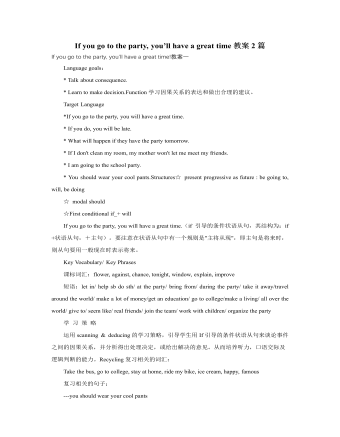
人教版新目标初中英语八年级下册If you go to the party, you’ll have a great time教案2篇
区分宾语从句、定于从句和状语从句宾语从句和状语从句,都叫做主从复合句。宾语从句主要是中考必考的,是初中阶段必掌握的从句,宾语从句主要是掌握三要素,所谓宾语从句,就是宾语在主从复合句当中充当宾语的一个句子,叫做宾语从句。主句的谓语动词是及物动词,后面如果是词或者是短语的话,是简单句,如果是句子的话,肯定是宾语从句。I know that he good at English.就是宾语从句,三要素,一要素是要注意连词,连词一共学了三类连词,一类连词是that口语当中可以省略,就像刚才说的那一句,I hear he is good at English.还有疑问代词、疑问副词,how where when,疑问代词、疑问副词。还有一类连词weather是否的意思,不是状语从句当中的如果,这一定要和如果区分开,这是是否。I don't know if he interested at English。宾语从句要注意if是连词。第二要素是语序,要用陈述举语序。比如说你家有几口人,我们都说How many people are there in you family?但是这是简单句,一旦说成宾语从句,你可以告诉我你家有几口人吗?Could you tell me how many people there are in you family ?

人教版新目标初中英语八年级下册It’s a nice day, isn’t it教案2篇
"Hello! Welcome to English class! Introduce yourself. Meet your new classmates." That's what the teacher says. What do you say? "Oh no!" It can be difficult talking to new people. But it can be fun, and you can make friends. How do you do it? Make small talk. Small talk is polite conversation. "Wang Nan is a great pingpang player, isn't she?" "I'd love to meet her, wouldn't you?" "It's been raining a lot, hasn't it?" Tag questions are a form of polite speech. To make small talk successfully, you should know how to make them. You should also know what topics to talk about. Try to learn this unit carefully. The next time you're in English class, you'll find out. Making small talk's easy, isn't it? (“你好!欢迎你!请做一下自我介绍。认识一下你的新同学。”通常在课上老师会这样说。你会说什么呢?“噢,不!”与陌生人谈话太困难了。但是这也很有意思,并且你还能交到朋友。你该怎么做呢?闲聊。闲聊指得是礼貌的对话。“王楠是一个很棒的乒乓球运动员,不是吗?”“我希望自己能认识她,你呢?“今年的雨水很多,不是吗?”反意疑问句是一种礼貌用语。为了使得谈话成功,你应该知道怎样去进行闲聊。你还应该知道与不同的人该谈论什么样的话题。认真的学习这个单元吧,下次在英语课上,你会发现与大家展开谈话是一件很容易的事情,不信我们来试试。)
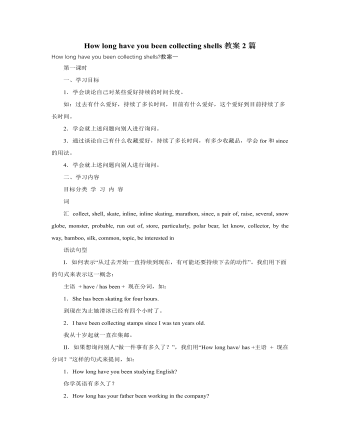
人教版新目标初中英语八年级下册How long have you been collecting shells教案2篇
Step Ⅱ Show the new words on the screen and teach the new words. Read the new words to students and ask them to repeat.Step Ⅲ 3aThis activity introduces new vocabulary and provides reading practice using the target language.In this activity first look at the four pictures.T: What can you see in the pictures?Ss: Four snow globes.T: Right. There are four snow globes in the pictures. And what are they?Ss: They are a monster, two polar bears, two penguins and a birthday cake.Write these words on the blackboard: snow globe; monster; polar bear; penguin and birthday cake. Read them to the class and ask students to repeat each one. Make sure students understand each word.Use a computer to show the E-mail message on the screen and read the message to students.Get students to read the e-mail on their own, and then draw lines connecting each snow globe and its description.Correct the answers.AnswersA line should connect each snow globe picture with the words that describe it in the letter.Step Ⅳ 3bThis activity provides writing practice using the target language.First review Activity 2a on Page 47.Then ask students to complete the message according to Activity 2a.Some partial sentences are given to students. Write about one person's collection.When students work, walk around the room checking the progress and offering help as needed.When they finish, ask some students to read their messages to the class.

人教版新目标初中英语八年级下册What were you doing when the UFO arrived教案2篇
(一).知识方面: 1.培养学生能运用过去进行时来描述、谈论过去某个时间正在发生的事情或动作的意识和能力,能就过去某个时间正在发生的动作做出正确的描述。 2.培养学生的想象力和角色扮演的合作能力。 3.培养学生讲述过去发生的事情经过的能力。能正确运用一般过去时来讲述故事。 (二).技能方面: 1.本单元的语言目标是Talk about past events and tell a story(谈论过去的时间和讲述一个故事),围绕这一目标,要涉及句型: What were you doing when the UFO arrived? ----I was sitting in the barber’s chair. The barber was cutting my hair. 因此必须学习standing、studying、cleaning、sleeping、cooking、making、eating、cutting、等表示地点的词,以便为上述句型提供语言材料。2.学习过去进行时的有关知识。Was/were+现在分词,是该时态的表达式。 3.在学习过程中,要区分The boy was walking down the street when the UFO landed.和While the boy was walking down the street, the UFO landed.这两种由when和while引导的状语从句的句型结构。注意它们的不同。
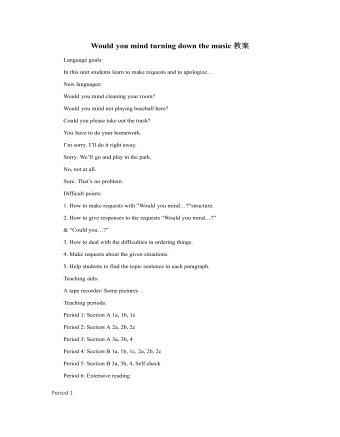
人教版新目标初中英语八年级下册Would you mind turning down the music教案
Step 4. Group work (4)1. Ask a pair of students to read the dialogue. Say, This activity provides speaking, listening and writing practice using the target language.2. Ask students to complete the work in groups.3. Check the answers with the whole class. 4. Explain some of the language points. Step 5. Word review (Self check 1)1. Ask students to read the words and the phrases given. 2. Fill in the blanks with proper forms of these words to complete the sentences. 3. Check the answers with the whole class. Homework:Do activity 2 on page 57 after class. Period 6Teaching aims: 1. Teach vocabulary words and the useful expressions. 2. Enable the students to learn etiquette in different culture. 3. Help the students learn how to behave politely in public places and in daily life. Teaching procedures:Step 1. RevisionHelp students to review the function of making requests through a free talk. Then lead them to the topic of etiquette. Explain the meaning of etiquette. Or, ask students to look it up in the dictionary. Step 2. Pre-reading (Section 1)1. Ask students to read the picture and make a list with their partner about how many rules of etiquette can be seen being broken.

人教版新目标初中英语九年级上册Teenagers should be allowed to choose their own clothes教案2篇
Step 1 Greeting Greet the class and check the homeworkStep 2 A duty report The S on duty gives a report on the rules in his home and lead in 3a “Sun Fei’s and Wu Yu’s rules” Step 3 ReadingSs read the conversation and write the two girls’ rules in the chart. Check the answers.Get Ss to read after the tape and then read aloud by themselves. Then, T explains the language points.Step 4 Pairwork 3bRole play. Use the information in chart to practice with the conversation in 3a covered. They can look at the sample conversation in the right box.Step 5 Task 2 “Who’s the best reporter?”Make a survey by asking any 5 students the questions in the chart in activity 4. Then give out a report about it. See who is the best reporter? And the best reporter will get a nice ball-pen.Step 6 Summary and homework:Write out the report in your exercise-books.Period ThreeStep 1 Greeting and a duty reportThe S gives a duty report talking about his experience of being late for school. Lead in the question “Do you ever get to school late? How often do you get to school late? Always, usually, sometimes, or never?Step 2 1a Get Ss to finish writing.Step 3 Pairwork 1b Get Ss to talk about their answers with their partners using the sample conversation in the box on the right.Step 4 Listening practice2a Lead-in: What will happen if you get to school late? What about Peter? Let’s listen to a conversation between Peter and his father. Get Ss to finish 2a (As usual, for the first time, Ss only listen.) Check the answers.
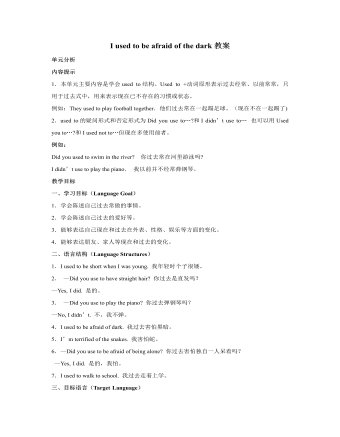
人教版新目标初中英语九年级上册I used to be afraid of the dark教案
内容提示1.本单元主要内容是学会used to结构。Used to +动词原形表示过去经常、以前常常,只用于过去式中,用来表示现在已不存在的习惯或状态。例如:They used to play football together.他们过去常在一起蹋足球。(现在不在一起踢了)2.used to的疑问形式和否定形式为Did you use to…?和I didn’t use to… 也可以用Used you to…?和I used not to…但现在多使用前者。例如:Did you used to swim in the river? 你过去常在河里游泳吗?I didn’t use to play the piano. 我以前并不经常弹钢琴。教学目标一、学习目标(Language Goal) 1.学会陈述自己过去常做的事情。2.学会陈述自己过去的爱好等。3.能够表达自己现在和过去在外表、性格、娱乐等方面的变化。4.能够表达朋友、家人等现在和过去的变化。二、语言结构(Language Structures) 1.I used to be short when I was young. 我年轻时个子很矮。 2. —Did you use to have straight hair? 你过去是直发吗?—Yes, I did. 是的。 3. —Did you use to play the piano? 你过去弹钢琴吗?—No, I didn’t. 不,我不弹。 4.I used to be afraid of dark. 我过去害怕黑暗。 5.I’m terrified of the snakes. 我害怕蛇。

人教版新目标初中英语九年级下册By the time I got outside, the bus had already left教案
Ⅰ. Teaching Aims and Demands1. Knowledge Objects(1) Key Vocabularyoversleep(2) Target LanguageWhat happened?I overslept. And by the time I got up, my brother had already gotten in the shower.2. Ability Objects(1) Teach the students to use the new words.(2) Train the students to narrate past events with the Past Perfect Tense.(3) Train the students' listening and speaking skills with the target language.3. Moral ObjectIt’s a good habit to go to bed early in the evening and get up early in the morning. So you’ll never be in a hurry in the morning.Ⅱ. Teaching Key Points1. Key Vocabularyoversleep2. Target LanguageNarrate past events with the Past Perfect TenseⅢ. Teaching Difficult Points1. Train the students to narrate past events with the Past Perfect Tense.2. Train the students to understand the target language in spoken conversation.Ⅳ. Teaching Methods1. Thinking of examples from the students' real lives.2. Making sentences by looking at the pictures.Ⅴ. Teaching AidA tape recorderⅥ. Teaching ProceduresStep I Revision1. Revise the language points in Unit 8.Ask some questions like this: What volunteer work would you like to do?Help the students to answer, I’d like to…/I love to…/I hope to2. Practice the dialogue in Activity 3c on page 62 again. Get students to role play the similar dialogues with the following.

人教版新目标初中英语九年级下册I’ll help clean up the city parks教案
Talk about offering help (P60)I’ll help clean up the city parks.A: I’d like to work ...B: You could help ...Talk about ways to tell people about the Clean-Up Day (P61)We need to ...We can’t ...I’ll ...Talk about the work the volunteers do (P62)These three students all volunteer their time to help other people.Somebody loves to ... / helps ... / plans to ... / wants to ...A: What do you like doing?B: I like ... A: What kind of volunteer work do you think I could do?B: You could ...1. 重点词汇advertisement, fix, repair, pleasure, blind, deaf, shut, carry, specially, fetch2. 认读词汇hunger, homeless, cheer, clean-up, sign, establish, major, commitment, elementary, veterinarian, coach, similar, call-in, strategy, disabled, organization, unable, support, appreciate, donation, part of speech, pronoun, adverb, preposition, conjunction, donate, Jimmy, Sally3. 词组clean up, cheer up, give out, put off, set up, think up, take after, fix up, give away, put up, hand out, work out, at once

人教版新目标初中英语九年级下册We’re trying to save the manatees教案2篇
本单元主要围绕着有关濒临灭绝的动物这一话题,学习了应该怎样保护我们的环境,以及就某一问题展开辩论。目标提示语言目标能够运用所学知识,就某一问题展开辩论。认知目标1、复习一些语法:现在进行时、一般现在时、用used to 表示一般过去时、现在完成时、一般过去时的被动语态。2、学会表达同意和不同意。3、学会以下基本句型:We’re trying to save the manatees.Manatees eat about 100 pounds of food a day.There used to be a lot of manatees.In 1972,it was discovered that they were endangered.Some of the swamps have become polluted.情感目标了解一些濒临灭绝的动物的生活习性和濒临灭绝的原因,教育学生应该如何保护环境。教学提示充分利用多媒体等教学设备,创设与本课话题相关的情境,如各种不同种类的动物、动物园以及有关环境的画画等等。围绕着本单元的教学目标,设计一些贴近学生实际的教学任务,如让学生谈论自己最喜欢的动物,如何拯救濒危动物,如何保护环境等等。让学生根据所学知识,就动物园是否对动物有利以及其他的话题进行辩论。

人教版新目标初中英语九年级下册You’re supposed to shake hands教案
教学目标:1. 掌握本单元一些重点词汇的写法和用法。2. 学会自如谈论餐桌礼仪。Step 1 RevisionAsk some students to retell the customs at the table in France in the passage in 3a.Step 2 Self checkPart 1. Fill in each bland with the correct word given. Students do the exercises by themselves at first. Then check the answers. Ask the students to comprehend the sentences and help them point out uses of some words, like “arrive (at / in) sw., spend time / money on sth , spend time / money (in) doing sth.”Part 2. Read about Fan Ling’s experience in a western restaurant. Understand the passage. Point out some key points in the passage.1. be / get used to doing sth. 习惯做某事2. begin with = start with 以….开头3. crowd v. 挤满,塞满 the crowd 人群 crowded adj. 拥挤的Then students discuss about how she would solve her problem. Ask some to share their stories with others.Part 3. Complete the crossword by looking at the sentences on the left. Then check the answers.

人教版高中历史必修1世界多极化趋势的出现教案2篇
一、 教学目标 (一)知识与能力通过了解多极化趋势和对世界的影响、欧盟的形成和扩展、日本成为经济大国的过程和原因、中国和第三世界的崛起等基本史实,培养学生综合探究和归纳知识的能力(二)过程与方法以合作学习的“创设情境—目标显示—自学尝试—合作学习—成果汇报—总结评价”模式为主线,以学生自主探究活动为主体,以教师点拨为主导,以培养学生学习的兴趣和能力为中心,来优化课堂教学。教师创设重大国际事件的情境,让学生亲自探索各个主要国家对朝鲜战争和伊拉克战争立场和态度的决策,培养学生解读历史信息能力,并能够根据自身的实际情况和外部环境,正确应对重大事件。 (三)情感态度与价值观提高学生对二战后美苏两极以外的各种政治经济力量增长的认识,初步理解世界多极化趋势的形成及影响,树立世界走向多极化是不可阻挡的历史潮流的价值判断标准。
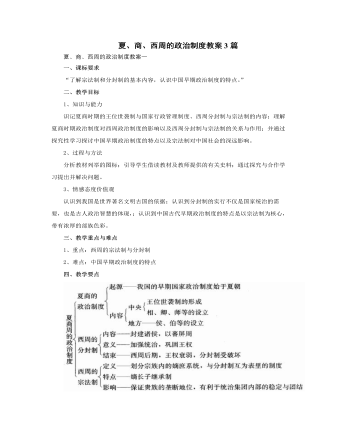
人教版高中历史必修1夏、商、西周的政治制度教案3篇
【大宗与小宗的关系:君臣关系、兄弟关系】4、影响:宗法制保证了贵族在政治上的垄断和特权地位,也有利于统治集团内部的稳定和团结。【合作探究】分封制与宗法制的关系两者互为表里、相辅相成:从根本上说,分封制就是宗法制作用于国家地方政治制度的重要举措和体现。宗法制是分封制的内核和纽带,维护贵族统治集团内部的稳定与团结。宗法制与分封制结合紧密,宗法制是西周政治制度的基础,分封制基于宗法制而产生,与宗法制互为表里。小结:我国早期政治制度(夏商周)发展脉络:起源于夏——初步建立于夏商——完善于西周——瓦解于西周末年到春秋——崩溃于战国★问题解答⊙【学思之窗】从这段记载,你能看出商朝的相权有多大吗?答案提示:相是商朝中央最高官吏,相权很大,包括参定政制、主持政务、辅佐商王等,甚至有时可废立商王。
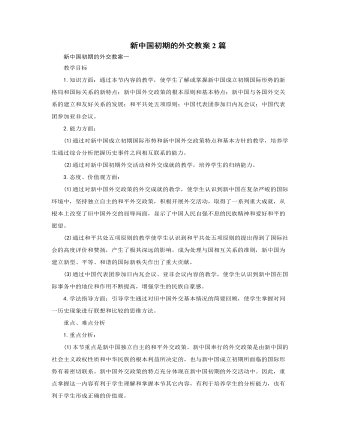
人教版高中历史必修1新中国初期的外交教案2篇
展示幻灯片17、19——21视频18,了解与中国建交的17个国家的概况,说明这是新中国成立后外交上取得的首次突破。 第一个和中国建交的非社会主义国家印度继承了英帝国主义在中国的特权,建国后中印双方多次就西藏问题进行谈判,正是在这一过程中周总理创造性地提出了和平共处五项原则。 成就2和平共处五项原则的提出 展示幻灯片22、23及视频24 探究:和平共处五项原则形成的过程是怎样的?内容是什么?有何意义? 结论(一)三个提出过程,强调重点是首次提出 (二)内容及其修订 (三)意义:标志着新中国外交的成熟;它为开创中国外交新局面奠定了基础;在世界上也产生深远的影响,成为解决国与国之间问题的基本准则。 展示幻灯片25、26 问题情境3:三、步入世界外交舞台

人教版高中历史必修2近代中国经济结构的变动教案
★本课小结:通过学习,我们可以看出鸦片战争后,随着外国资本主义经济的入侵,中国近代经济结构发生了重大变动:自然经济逐渐瓦解,商品经济日益发展,中国民族资本主义产生,中国社会经济结构正经历着一场史无前例的大转型。清政府内部的洋务派为了维护封建统治,掀起了洋务运动。这次运动在促使本国封建经济瓦解的同时,对民族资本主义的产生起了诱导作用。受外商企业和洋务运动的诱导,十九世纪六七十年代民族资本主义在中国产生,由于受外国资本与本国封建势力的压制,举步维艰;下节课,我们将关注中国资本主义的曲折发展。★问题解答⊙【学思之窗】你认为郑观应的批评是否有道理?为什么?参考答案:(1)有道理。(2)原因:①郑观应认识到了社会制度层面的“体”与科学技术层面的“用”之间不是等同的关系。
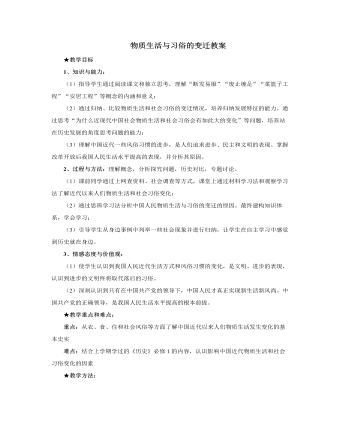
人教版高中历史必修2物质生活与习俗的变迁教案
★教学总结:(1)我国衣着服饰变化的三大阶段第一阶段(鸦片战争后到新中国的建立):这一阶段的阶段特征为中式与西式、传统和现代服饰并存男装:长袍马褂、西装、中山装 女装:旗袍(新式与旧式)第二阶段(新中国建立后到十一届三中全会):这一时期由于政治上的影响,阶段特征为衣着朴素,与革命相关的服饰成为主流男装:列宁装、中山装、绿军装女装:列宁装、布拉基、绿军装第三阶段(十一届三中全会后):阶段特征为与世界接轨,异彩纷呈;具体表现在,服饰由最基本的防寒保暖向美观大方转变,各种款式的服装层出不穷现在的服装是色彩鲜艳、款式多样,什么牛仔服、休闲服、西装、T恤衫、晚礼服,真是不胜枚举。每年服装的流行色、流行款式不断改变,大街上的姑娘和小伙子永远领导着时装新潮流。模特表演、模特广告和模特大赛已成为人们穿着方面不可缺少的内容。

人教版高中历史必修2二战后苏联的经济改革教案
⑤强调对外关系的灵活性。戈尔巴乔夫指出在对外政策中要采取多种办法选择不同的策略路线达到既定目标。在外交谈判中不要为自己制造死胡同,也不要给对方制造死胡同,要善于迎合伙伴,寻求接触点。在这种思想指导下,苏共采取的对外战略是以军控为中心的缓和战略,具体政策是继续与美国就裁军、消减核武器、限制地区冲突等问题进行谈判,缓解苏美关系;对西欧争取建立“全欧大厦”;对东欧实行纠偏、不干涉政策;对中国改善关系,实现关系正常化;调整与第三世界国家关系,解决阿富汗、柬埔寨等问题。 3、影响:①经济改革措施仓促上马,缺少宏观决策和相应的配套措施;加上戈尔巴乔夫没有放弃苏联的传统做法,继续优先发展重工业,致使改革未达到预期的效果,苏联经济持续下滑②经济体制改革受挫后,把改革的重点转向政治领域,最终导致国内局势的失控和苏联的解体。
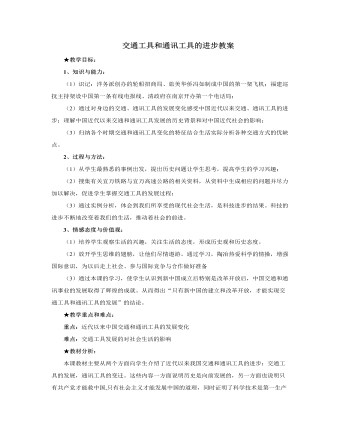
人教版高中历史必修2交通工具和通讯工具的进步教案
★教后记:历史教学的最高目标不是单纯的记忆和培养能力,而是树立正确的历史观,培养学生的历史责任感。从这一点讲,新课标及新课标教材给老师极大的发挥空间,摆脱了以往的“教教材”,真正实现了 “用教材教”,只有这样,教师才不只是一个“备课”的“教书匠”,而是一名设计教学“设计师”,以教材为砖瓦,建造有自己独特风格的教育大厦。这是我设计教学的出发点。开放式的课堂需要思想开放的教师,但对教师的课堂驾驭能力要求更高,否则“一放就活,一活就乱”,只求课堂热闹,热闹过后,学生一无所获,那么这样的开放课堂依然是失败的。开放式的课堂并不是任由学生说,教师必要的引导与客观的评价尤为重要。★问题解答⊙【学思之窗】请谈谈,火车机车的不断改进,给国民经济发展、百姓生活带来怎样的影响?答案提示:运输量大,有利于各地区的物资交流和劳动力流动,促进经济发展;交通便利快捷;机车内部环境舒适,给百姓出行带来方便。

人教版高中历史必修2殖民扩张与世界市场的拓展教案
●活动与探究从葡萄牙、西班牙、荷兰的兴衰历程,从英国的强盛历程,我们从中可获得什么启示?启示:积极发展本国的工商业;实现制度创新;抓住机遇,及时更新观念;建立能保障自身经济顺利发展的国防力量,尤其是海军力量;积极发展海外贸易,实行对外开放……★本课小结16世纪后期荷兰积极向海外殖民扩张,在17世纪建立了世界范围内的殖民帝国;17世纪开始,英国也积极向海外殖民扩张,并与荷兰、法国进行了激烈的争夺,到18世纪中期,英国成为世界上最大的殖民国家,最终确立了世界殖民霸权;新航路开辟后,伴随着殖民扩张,人类的商业活动开始在全球范围内开展,人类的经济活动由于世界市场的出现而第一次被广泛地联系在一起,而西欧国家对殖民地财富、资源、劳动力的暴力掠夺,是欧洲发展和兴旺的重要条件,也是亚、非、拉美灾难的根源。

